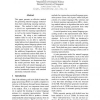Free Online Productivity Tools
i2Speak
i2Symbol
i2OCR
iTex2Img
iWeb2Print
iWeb2Shot
i2Type
iPdf2Split
iPdf2Merge
i2Bopomofo
i2Arabic
i2Style
i2Image
i2PDF
iLatex2Rtf
Sci2ools
158
click to vote
EMNLP
2009
2009
Natural Language Generation with Tree Conditional Random Fields
This paper presents an effective method for generating natural language sentences from their underlying meaning representations. The method is built on top of a hybrid tree representation that jointly encodes both the meaning representation as well as the natural language in a tree structure. By using a tree conditional random field on top of the hybrid tree representation, we are able to explicitly model phrase-level dependencies amongst neighboring natural language phrases and meaning representation components in a simple and natural way. We show that the additional dependencies captured by the tree conditional random field allows it to perform better than directly inverting a previously developed hybrid tree semantic parser. Furthermore, we demonstrate that the model performs better than a previous state-of-the-art natural language generation model. Experiments are performed on two benchmark corpora with standard automatic evaluation metrics.
EMNLP 2009 | Hybrid Tree | Hybrid Tree Representation | Natural Language | Natural Language Processing |
Related Content
| Added | 17 Feb 2011 |
| Updated | 17 Feb 2011 |
| Type | Journal |
| Year | 2009 |
| Where | EMNLP |
| Authors | Wei Lu, Hwee Tou Ng, Wee Sun Lee |
Comments (0)

